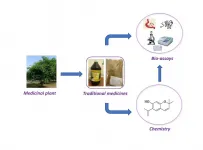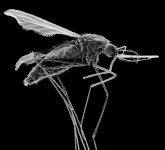Multiple mosquito blood meals accelerate malaria transmission
2021-01-02
(Press-News.org) Multiple bouts of blood feeding by mosquitoes shorten the incubation period for malaria parasites and increase malaria transmission potential, according to a study published December 31 in the open-access journal PLOS Pathogens by Lauren Childs of Virginia Tech, Flaminia Catteruccia of the Harvard T.H. Chan School of Public Health, and colleagues. Given that mosquitoes feed on blood multiple times in natural settings, the results suggest that malaria elimination may be substantially more challenging than suggested by previous experiments, which typically involve a single blood meal.
Malaria remains a devastating disease for tropical and subtropical regions, accounting for an estimated 405,000 deaths and 228 million cases in 2018. In natural settings, the female Anopheles gambiae mosquito -- the major malaria vector -- feeds on blood multiple times in her lifespan. Such complex behavior is regularly overlooked when mosquitoes are experimentally infected with malaria parasites, limiting our ability to accurately describe potential effects on transmission. In the new study, the researchers examine how additional blood feeding affects the development and transmission potential of Plasmodium falciparum malaria parasites in An. gambiae females.
"We wanted to capture the fact that, in endemic regions, malaria-transmitting mosquitoes are feeding on blood roughly every 2-3 days", says W. Robert Shaw, a lead author of this study. "Our study shows that this natural behavior strongly promotes the transmission potential of malaria parasites, in previously unappreciated ways".
The results show that an additional blood feed three days after infection with P. falciparum accelerates the growth of the malaria parasite, thereby shortening the incubation period required before transmission to humans can occur. Incorporating these data into a mathematical model across sub-Saharan Africa reveals that malaria transmission potential is likely higher than previously thought, making disease elimination more difficult. In addition, parasite growth is accelerated in genetically modified mosquitoes with reduced reproductive capacity, suggesting that control strategies using this approach, with the aim of suppressing Anopheles populations, may inadvertently favor malaria transmission. The data also suggest that parasites can be transmitted by younger mosquitoes, which are less susceptible to insecticide killing, with negative implications for the success of insecticide-based strategies. Taken together, the results suggest that younger mosquitoes and those with reduced reproductive ability may provide a larger contribution to infection than previously thought.
According to the authors, the findings have important implications for accurately understanding malaria transmission potential and estimating the true impact of current and future mosquito control measures.
INFORMATION:
Peer-reviewed; Experimental study; Animals; Cells
In your coverage please use this URL to provide access to the freely available article in PLOS Pathogens: http://journals.plos.org/plospathogens/article?id=10.1371/journal.ppat.1009131
Citation: Shaw WR, Holmdahl IE, Itoe MA, Werling K, Marquette M, Paton DG, et al. (2020) Multiple blood feeding in mosquitoes shortens the Plasmodium falciparum incubation period and increases malaria transmission potential. PLoS Pathog 16(12): e1009131. https://doi.org/10.1371/journal.ppat.1009131
Funding: F.C. is funded by a Faculty Research Scholar Award by the Howard Hughes Medical Institute (HHMI) and the Bill & Melinda Gates Foundation (BMGF) (Grant ID: OPP1158190, http://www.hhmi.org), and by the National Institutes of Health (NIH) (R01 AI124165, R01 AI153404, http://www.nih.gov). L.M.C. is supported by the National Science Foundation (NSF) (Grant ID: 1853495, http://www.nsf.gov). The findings and conclusions within this publication are those of the authors and do not necessarily reflect positions or policies of the HHMI, the BMGF, or the NIH. The funders had no role in the study design, in data collection, analysis or interpretation, in the decision to publish, or the preparation of the manuscript.
Competing interests: The authors have declared that no competing interests exist.
[Attachments] See images for this press release:

ELSE PRESS RELEASES FROM THIS DATE:
2021-01-02
The discovery of new drugs is vital to achieving the eradication of neglected tropical diseases (NTDs) in Africa and around the world. Now, researchers reporting in PLOS Neglected Tropical Diseases have identified traditional Ghanaian medicines which work in the lab against schistosomiasis, onchocerciasis and lymphatic filariasis, three diseases endemic to Ghana.
The major intervention for NTDs in Ghana is currently mass drug administration of a few repeatedly recycled drugs, which can lead to reduced efficacy and the emergence of drug resistance. Chronic infections of schistosomiasis, onchocerciasis and lymphatic filariasis ...
2021-01-02
In the ongoing arms race between humans and the parasite that causes malaria, Taane Clark and colleagues at the London School of Hygiene and Tropical Medicine (LSHTM) report that new mutations that enhance resistance to a drug used to prevent malaria in pregnant women and children are already common in countries fighting the disease. The new results are published December 31 in PLOS Genetics.
Malaria causes about 435,000 deaths each year, primarily in young children in sub-Saharan Africa. Despite a long-term global response, efforts to control the disease are hampered by the rise of drug-resistant strains of the parasite species that cause malaria. Sulfadoxine-pyrimethamine (SP), ...
2021-01-02
UNIVERSITY PARK, Pa. -- A desalination membrane acts as a filter for salty water: push the water through the membrane, get clean water suitable for agriculture, energy production and even drinking. The process seems simple enough, but it contains complex intricacies that have baffled scientists for decades -- until now.
Researchers from Penn State, The University of Texas at Austin, Iowa State University, Dow Chemical Company and DuPont Water Solutions published a key finding in understanding how membranes actually filter minerals from water, online today (Dec. 31) in Science. The article will be featured on the print edition's cover, to be issued tomorrow (Jan. ...
2021-01-02
Predicting when and how collections of particles, robots, or animals become orderly remains a challenge across science and engineering.
In the 19th century, scientists and engineers developed the discipline of statistical mechanics, which predicts how groups of simple particles transition between order and disorder, as when a collection of randomly colliding atoms freezes to form a uniform crystal lattice.
More challenging to predict are the collective behaviors that can be achieved when the particles ...
2021-01-02
High in the clouds, atmospheric aerosols, including anthropogenic air pollutants, increase updraft speeds in storm clouds by making the surrounding air more humid, a new study finds. The results offer a new mechanism explaining the widely observed - but poorly understood - atmospheric phenomenon and provide a physical basis for predicting increasing thunderstorm intensity, particularly in the high-aerosol regions of the tropics. Observations worldwide have highlighted aerosols' impact on weather, including their ability to strengthen convection in deep convective clouds, like those ...
2021-01-02
A new analysis suggests that, by 2040, 19% of the world's population - accounting for 21% of the global Gross Domestic Product - will be impacted by subsidence, the sinking of the ground's surface, a phenomenon often caused by human activities such as groundwater removal, and by natural causes as well. The results, reported in a Policy Forum, represent "a key first step toward formulating effective land-subsidence policies that are lacking in most countries worldwide," the authors say. Gerardo Herrera Garcia et al. performed a large-scale ...
2021-01-02
When the COVID-19 pandemic reached Africa, the continent was already struggling to deal with another public health crisis - a growing cancer epidemic characterized by more than one million new cancer cases and nearly 700,000 deaths per year. In a Perspective, Beatrice Wiafe Addai and Wilfred Ngwa discuss the significant challenges COVID-19 imposed on cancer prevention and control in Africa and how the efforts to address these challenges highlight key opportunities where greater investment could improve cancer care globally. At the start of the pandemic, many African ...
2021-01-02
Overcoming a key obstacle in achieving diamond-based electronic and optoelectronic devices, researchers have presented a new way to fabricate micrometer-sized diamonds that can elastically stretch. Elastic diamonds could pave the way for advanced electronics, including semiconductors and quantum information technologies. In addition to being the hardest materials in nature, diamonds have exceptional electronic and photonic properties, featuring both ultrahigh thermal and electric conductivity. Not only would diamond-based electronics dissipate heat more quickly, reducing the need for ...
2021-01-02
CHAPEL HILL, NC--Boosting immune system T cells to effectively attack solid tumors, such as breast cancers, can be done by adding a small molecule to a treatment procedure called chimeric antigen receptor-T (CAR-T) cell therapy, according to a study by researchers at the UNC Lineberger Comprehensive Cancer Center. The boost helps recruit more immune cells into battle at the tumor site. The findings are published in the Journal of Experimental Medicine.
CAR-T immunotherapy, in which T cells are modified in the laboratory to express chimeric antigen receptors, CARs, that in turn target surface proteins ...
2021-01-02
Producing clean water at a lower cost could be on the horizon after researchers from The University of Texas at Austin and Penn State solved a complex problem that has baffled scientists for decades, until now.
Desalination membranes remove salt and other chemicals from water, a process critical to the health of society, cleaning billions of gallons of water for agriculture, energy production and drinking. The idea seems simple -- push salty water through and clean water comes out the other side -- but it contains complex intricacies that scientists ...
LAST 30 PRESS RELEASES:
[Press-News.org] Multiple mosquito blood meals accelerate malaria transmission




